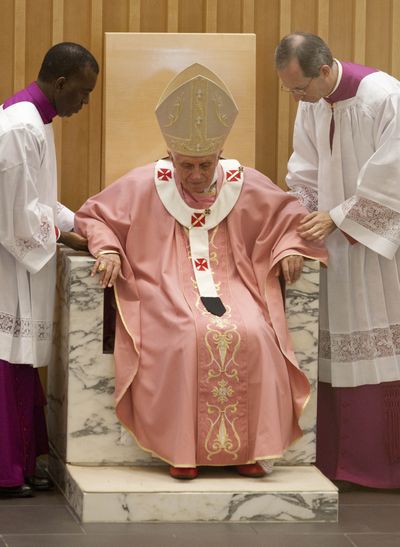Visitors find pope frail, weary
Yet he was strong on west Africa trip

VATICAN CITY – Pope Benedict XVI seems worn out.
People who have spent time with him recently say they found him weaker than they’d ever seen him, seemingly too tired to engage with what they were saying. He no longer meets individually with visiting bishops. A few weeks ago he started using a moving platform to spare him the long walk down St. Peter’s Basilica.
Benedict turns 85 in the new year, so a slowdown is only natural. Given his age and rigorous work schedule, it’s remarkable he does as much as he does and is in such good health overall: Just this past week he confirmed he would travel to Mexico and Cuba next spring.
But a decline has been noted as Benedict prepares for next weekend’s grueling Christmas celebrations, which kick off two weeks of intense public appearances. That raises questions about the future of the papacy given that Benedict himself has said popes should resign if they can’t do the job.
Vatican spokesman the Rev. Federico Lombardi has said no medical condition prompted the decision to use the moving platform in St. Peter’s, and that it’s merely designed to spare the pontiff the fatigue of the 100-yard walk to and from the main altar.
And Benedict rallied during his three-day trip to Benin in west Africa last month, braving temperatures of 90 degrees and high humidity to deliver a strong message about the future of the Catholic Church in Africa.
Back at home, however, it seems the daily grind of being pope – the audiences with visiting heads of state, the weekly public catechism lessons, the sessions with visiting bishops – has taken its toll. He doesn’t elaborate off-the-cuff much anymore, and some days he just seems wiped out.
Take for example his recent visit to Assisi, where he traveled by train with dozens of religious leaders from around the world for a daylong peace pilgrimage. For anyone participating it was a tough, long day; for the aging pope it was even more so.
“Indeed I was struck by what appeared to me as the decline in Benedict’s strength and health over the last half year,” said Rabbi David Rosen, who had a place of honor next to the pope at the Assisi event as head of interfaith relations at the American Jewish Committee.
“He looks thinner and weaker … which made the effort he put into the Assisi shindig with the extraordinary degree of personal attention to the attendees (especially the next day in Rome) all the more remarkable,” Rosen said in an email.
That Benedict is tired would be a perfectly normal diagnosis for an 84-year-old, even someone with no known health ailments and a still-agile mind.
But Benedict is not a normal 84-year-old, both in what he is called to do and the implications if he were to stop.
Popes are allowed to resign; church law specifies only that the resignation be “freely made and properly manifested.”
Only a handful have done so, however. The last one was Pope Gregory XII, who stepped down in 1415 in a deal to end the Great Western Schism among competing papal claimants.
Benedict himself raised the possibility of resigning if he were simply too old or sick to continue, when he was interviewed for the book “Light of the World,” which was released in 2010.
“If a pope clearly realizes that he is no longer physically, psychologically and spiritually capable of handling the duties of his office, then he has a right, and under some circumstances, also an obligation to resign,” Benedict said.
It should be recalled that at the time Benedict was elected pope at age 78 – already the oldest pope elected in nearly 300 years – he had been planning to retire as the Vatican’s chief orthodoxy watchdog to spend his final years writing in his native Bavaria.
Benedict said in “Light of the World” that he knew his own strength was diminishing – steps are difficult for him and his aides regularly hold his elbows as he climbs up or down. But at the same time Benedict insisted that he had no intention of resigning to avoid dealing with the problems of the church.
“One can resign at a peaceful moment or when one simply cannot go on. But one must not run away from danger and say that someone else should do it,” he said.
As a result, a papal resignation anytime soon seems unlikely.